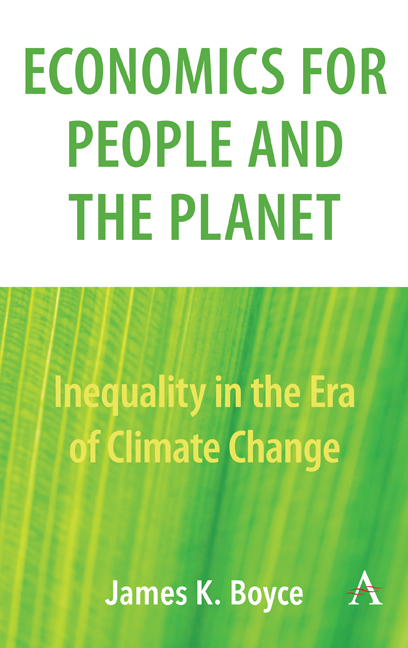Book contents
- Frontmatter
- Contents
- List of Illustrations
- Acknowledgements
- Part I Rethinking Economics and the Environment
- Part II Environmental Injustice
- Part III Climate Policy
- Chapter 17 Smart Climate Policy
- Chapter 18 Investment in Disadvantaged Communities
- Chapter 19 Dividends for All
- Chapter 20 Truth Spill
- Chapter 21 Four Pillars of Climate Justice
- Chapter 22 The Perverse Logic of Offsets
- Chapter 23 Climate Policy as Wealth Creation
- Chapter 24 The Carbon Dividend
- Chapter 25 Keeping the Government Whole
- Chapter 26 Air Quality Co-benefits in Climate Policy
- Chapter 27 Climate Adaptation: Protecting Money or People?
- Chapter 28 Forging a Sustainable Climate Policy
- Notes
- Publication History
- Index
Chapter 21 - Four Pillars of Climate Justice
from Part III - Climate Policy
Published online by Cambridge University Press: 12 February 2019
- Frontmatter
- Contents
- List of Illustrations
- Acknowledgements
- Part I Rethinking Economics and the Environment
- Part II Environmental Injustice
- Part III Climate Policy
- Chapter 17 Smart Climate Policy
- Chapter 18 Investment in Disadvantaged Communities
- Chapter 19 Dividends for All
- Chapter 20 Truth Spill
- Chapter 21 Four Pillars of Climate Justice
- Chapter 22 The Perverse Logic of Offsets
- Chapter 23 Climate Policy as Wealth Creation
- Chapter 24 The Carbon Dividend
- Chapter 25 Keeping the Government Whole
- Chapter 26 Air Quality Co-benefits in Climate Policy
- Chapter 27 Climate Adaptation: Protecting Money or People?
- Chapter 28 Forging a Sustainable Climate Policy
- Notes
- Publication History
- Index
Summary
Climate justice is not only a moral imperative–it is a political necessity.
It is time for a new strategy for climate policy in America–a strategy founded on climate justice.
Climate justice has four pillars:
• Action: Climate change will affect us all, but its heaviest costs will fall upon low-income people who live closest to the margin of survival and are least able to afford air conditioners, sea walls and other types of insurance. Climate inaction is climate injustice.
• Adaptation for all: We cannot prevent climate change altogether. Investments in adaptation are necessary, but how should these be allocated? The conventional economists’ prescription is that investments should be guided by ‘willingness to pay’, which of course depends on ability to pay. The implications of this logic were spelled out two decades ago in the Summers memorandum that purported to make the case for dumping toxic waste in low-wage countries. Climate justice requires that investment in adaptation should be guided by human needs, not by the distribution of purchasing power.
• Co-benefits: Burning fossil fuel releases not only carbon dioxide but also copollutants that endanger human health. Co-pollutant damages per ton of carbon dioxide vary greatly, so it makes sense to reduce emissions where the benefits of co-pollutant reductions are biggest. Because co-pollutants disproportionately impact low-income communities and minorities, integrating them into climate policy is a matter of climate justice as well as efficiency.
• Dividends: A cap on carbon emissions is essential, but instead of giving free permits to polluters–a central plank in ‘cap-and-trade’ schemes–polluters should pay. Permits are valuable: their holders will receive the fossil fuel price increases triggered by the cap. They should be auctioned, not given away, eliminating any need for permit trading. The revenues should be returned to the people as the rightful owners of the atmosphere's limited carbon-absorptive capacity (or any country's share of it).
Climate justice has not been the centerpiece of climate policy initiatives the United States. All too often, what is right has been subordinated to what is deemed politically expedient. Ironically, however, the proponents of realpolitik have been guilty of wishful thinking.
- Type
- Chapter
- Information
- Economics for People and the PlanetInequality in the Era of Climate Change, pp. 105 - 106Publisher: Anthem PressPrint publication year: 2019



